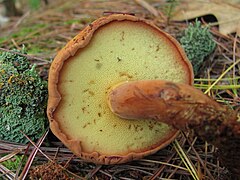Buchwaldoboletus lignicola
| Buchwaldoboletus lignicola | |
|---|---|
 |
|
 |
|
| Views of the top and underside of the cap of Buchwaldoboletus lignicola | |
| Scientific classification | |
| Kingdom: | Fungi |
| Division: | Basidiomycota |
| Class: | Agaricomycetes |
| Order: | Boletales |
| Family: | Boletaceae |
| Genus: | Buchwaldoboletus |
| Species: | B. lignicola |
| Binomial name | |
|
Buchwaldoboletus lignicola (Kallenb.) Pilát (1969) |
|
| Synonyms | |
Buchwaldoboletus lignicola is a species of bolete fungus in the family Boletaceae native to Europe and North America. Found on wood, it is actually parasitic on the fungus Phaeolus schweinitzii. It has a convex yellow- to rusty brown cap, yellow to yellow-brown pores and stipe, and a brown spore print. Its edibility is unknown.
Originally described by Franz Joseph Kallenbach in 1929 as Boletus lignicola, it was given its current name by mycologist Albert Pilát in 1969. He first placed it in the genus Pulveroboletus before erecting the new genus Buchwaldoboletus on account of its occurrence on wood (rather than in the ground), decurrent and arcuate pores, the yellow mycelium at the base of the stipe, the blueing flesh and lack of hyphal clamps. Other genera in which the species has been placed include Xerocomus by Rolf Singer in 1942,Gyrodon by Paul Heinemann in 1951, and Phlebopus by Meinhard Moser in 1955. The species name comes from the Latin words lignum "wood" and the verb cǒlěre "to inhabit".
Buchwaldoboletus lignicola is a member of the genus Buchwaldoboletus, which with the genus Chalciporus form group of fungi that is an early offshoot in the family Boletaceae. Many members appear to be parasitic.
...
Wikipedia
